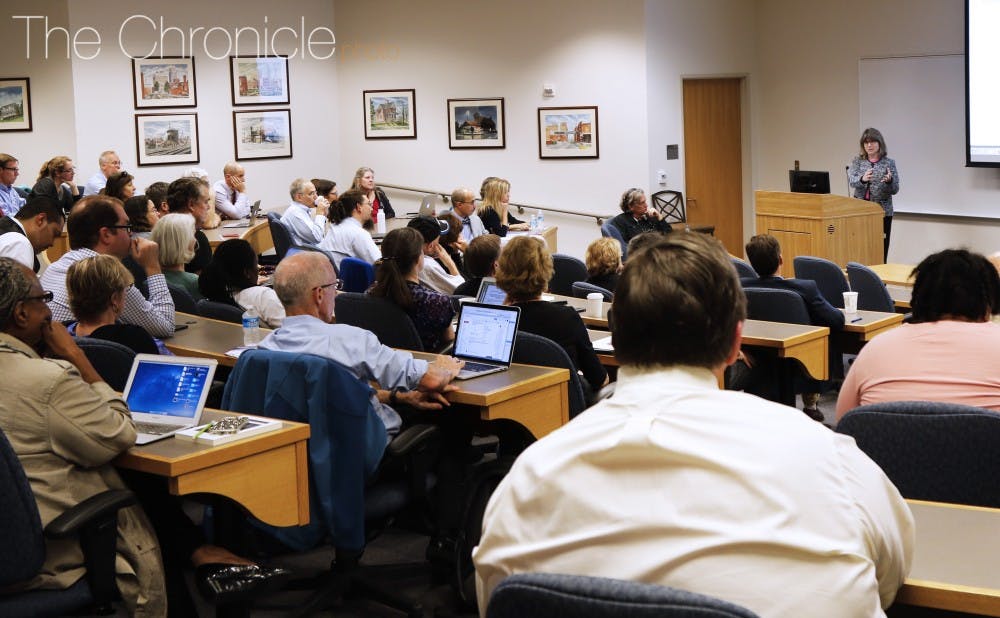The Academic Council discussed strategic planning themes to foster collaboration at Duke and a proposed Duke Kunshan University master's degree at its monthly meeting Thursday afternoon.
Provost Sally Kornbluth and Susan Lozier, chair of the Strategic Planning Steering Committee and Ronie-Richelle Garcia-Johnson professor of Earth and Ocean Sciences, provided the update on the University's ongoing strategic planning process, introducing initiatives aimed at increasing diversity and research opportunities.
“The focus was on how to build communities, of students and faculty, to really take advantage of initiatives and programs [already] put in place," Kornbluth said.
Kornbluth stressed the importance of making sure teaching and engagement are enriched by research conducted on campus. The purpose of Duke’s strategic plan is to increase connectivity between Duke and the broader world, through the linkage of research, educational and service missions, she explained.
During the discussion, Kornbluth described the plan's four key components, the first of which is to enrich the student experience by bolstering intellectual communities, especially at the graduate level.
“[We want] to offer students an intellectual endeavor outside of the classroom that will broaden them and deepen them, as well as intellectual alternatives to social scenes that will enable [students] to participate fully in the intellectual community," she said.
Lozier outlined the second and third goals—describing the need to develop a diverse and inclusive Duke community through collaborative endeavors among schools, centers and institutes, as well as the importance of the University engaging with the Durham community and across borders.
“There was tremendous enthusiasm for thinking about our engagement with our local community,” Lozier said. “Especially from a
Lozier also added that the University needs to move from "place-based" toward "issue-based" research that fosters global networks of learning and discovery.
"Communities across the globe have similar challenges, whether it's climate change, migration, demographics, inequality," Lozier said. "What we want to do is supplement the place-based approach with an issue-based approach dealing with issues that span borders and boundaries."
Lastly, the council discussed the fourth goal of promoting faculty research and leadership by providing resources and infrastructure, in addition to opportunities for interdisciplinary projects using technology.
Specific initiatives to meet each goal are anticipated to be developed by the end of the 2015-16 academic year and take effect in the 2016-17 academic year, Lozier said.
The council also heard a proposal for the creation of an international master’s program in environmental policy at DKU—presented by Erika Weinthal, Lee Hill Snowdon professor of environmental policy in the Sanford School of Public Policy, and Billy Pizer, a faculty fellow at the Nicholas School and professor at the Sanford School. The proposed two-year master's program would begin in the 2017-18 academic year and center around environmental research and law, culminating in a sustained effort to address environmental issues in China.
“This is a way to expand our educational offerings, our research, and have an impact in the world of policy,” Weinthal said.
Faculty raised questions, however, about the resources and funds available for the program, which is not expected to make a profit until its fifth year.
In other business:
Vice Provost for Research Larry Carin discussed proposed changes to the Office of Licensing and Ventures, which works to turn innovations by Duke researchers into marketable products.
Additionally, revisions were made to the Faculty Handbook regarding the process of approving new academic degrees.
Get The Chronicle straight to your inbox
Signup for our weekly newsletter. Cancel at any time.

